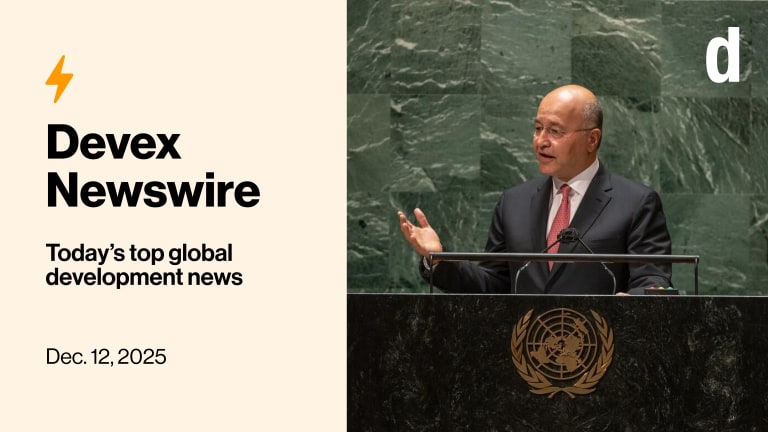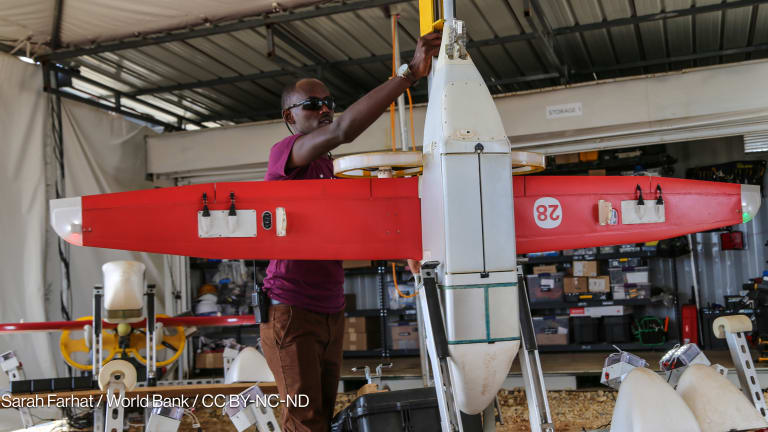Inside the Mastercard Foundation: A conversation with CEO Reeta Roy
“It’s about asking and it’s about listening. If you put it out there, it’s going to come right back,” Roy says.
The Mastercard Foundation was created nearly two decades ago when Mastercard — the global payment services corporation — went public in 2006. At the time, the company contributed a percentage of its assets toward the new foundation. Today, it has become one of the largest foundations in the world. With approximately $40 billion in assets, the foundation has big ambitions, along with offices across Canada and sub-Saharan Africa. By 2030, it hopes to reach 30 million young people across the African continent, connecting them with “dignified, fulfilling work.” On the sidelines of the World Bank and International Monetary Fund’s Spring Meetings, Devex asked Reeta Roy, the chief executive officer of the Mastercard Foundation, how she plans to achieve those ambitions — and what her reflections have been after 13 years at the helm of the foundation. This conversation has been edited for clarity and length. You decided in 2009 to focus on Africa, and you actually moved there, as the chief executive officer of the Mastercard Foundation. Tell us a bit about what you’ve been doing since 2009 — and what the Mastercard Foundation has grown to be. We made the decision in 2009 to focus on sub-Saharan Africa and specifically on young people. Our mandate is to do two things: To advance education and to advance financial inclusion. But about 10 years into this work, we took stock and said: What have we learned and what have we missed? And if we could do one thing, what would we do? The answer came fast. We needed to focus on young people and youth employment. And so, we set out a bold new strategy called Young Africa Works, which put out a goal of 30 million young people in dignified, fulfilling work. But to undertake that work, we felt we couldn’t do it from Toronto, as we’re a Canadian foundation. We needed to transform ourselves. And that’s what we did. My entire executive team is from Africa, most of our staff is from Africa, 66% of our partners — the organizations that we fund — are African. And it’s phenomenal. For a lot of people in this town, when they talk about the youth bulge in Africa, they say it with a sense of fear — a sense of foreboding. How do you see it? By 2035, the continent will have the youngest and the largest workforce in the world. That’s the future. But it’s not a challenge — it’s a massive opportunity. Just think about this: A massive talent pool for virtually every single industry that is facing a labor shortage. That takes an investment in education, skills, and knowledge transfer. But it also means getting behind young people and their ideas. That’s where the action is. I think the biggest challenge facing the continent is that so many people have an outdated picture of the African continent. It’s time to change that narrative. That is one of the reasons why your moving to Rwanda, and your team being from the continent of Africa, immediately changes the dynamic of your executive group. It’s not about: What do we do for the communities over there? It’s about: What do we do for the communities we come from and know? You are a foundation, that’s in your name. But you don’t think of yourself as a traditional foundation. What’s different about the way you actually operate? I’d like to think that we lead the foundation by listening, and by seeking first to understand. Walk into rooms, suspend judgments. We’re not the smartest kid in the room, and we’ve got a lot to learn. And the people who have the greatest amount to teach us, historically, have also been excluded from these conversations. These are the very people who live right with the problems — whether it is a shortage of X, Y, or Z. But they also have insights about what could work, which is one of the major reasons why when we think about sustainability, we see the huge importance of backing, getting behind, and accompanying African organizations that hold the trust of their communities. So many entrepreneurs are stuck because they don’t know how to talk the language of the philanthropy world. They don’t know how to interface. You seem to be doing something different in finding and unlocking the opportunities for people where they are. What lessons are there for the broader philanthropy community that you’ve learned over the last decade of doing this? The first thing I think is, one: listen. Second: go, see, create a network. Networks bring you into other networks. And those networks will change your mind, and in fact, will blow your mind. When you think about investing in young people, it is a profound thing. It’s not just about putting in money based on an elevator pitch. It is about building trust and really starting to understand how they see the world. We have met so many young entrepreneurs who have really reinvented what it means to run a school. What is a school? How do you deliver education? What is a bank? How do you distribute capital in a more accessible, affordable, private way, right to someone’s phone? They are cracking all nuts, and it’s time for us to get behind them. There is a sense that the world is spinning out of control a bit — that it’s hard to get financing where it’s needed, and that the climate situation is worsening. How do you see where your entry point is to actually moving the needle on these larger-scale issues you care so much about? There’s no question: It’s a time when there’s a great amount of fragmentation, and forces are pulling us apart rather than bringing us together. So when I think about what we’re doing in Africa, I look first at the young people and women and what they are already doing. They’re not waiting for us. They’re not waiting for some foundation or some charity to show up. Most of them have multiple income streams that they’re working on because that’s survival. But at its very core, it’s ingenuity. It’s innovation. It’s thinking about how do I get ahead, and how do I invest in myself. When you tap into that type of energy, what comes back are ideas around climate, ideas around regenerative agriculture, ideas about how we close gaps and make maternal and child health safer. It’s about asking and it’s about listening. You’ve been on this remarkable journey. You started as CEO of the foundation just shortly after it was founded, you’ve seen this incredible rise in its assets and what it’s able to do, and you’ve made this huge strategic shift, moving the entire foundation from Canada to Africa. What’s next, and how can this community engage and support the work you’re trying to do? What’s next is really what’s now, and that is getting behind young people. If you’re building a business, just listen. And if you’re not getting input from young people, go seek it right away. If you’re an organization just like ours — a philanthropy, a foundation — which fundamentally, at its core, has a business model of working through other organizations, then think about who is in the population of organizations I’m working with, and are they from this country? They’re the ones that have the greatest vested interests in positive outcomes.
The Mastercard Foundation was created nearly two decades ago when Mastercard — the global payment services corporation — went public in 2006. At the time, the company contributed a percentage of its assets toward the new foundation. Today, it has become one of the largest foundations in the world.
With approximately $40 billion in assets, the foundation has big ambitions, along with offices across Canada and sub-Saharan Africa. By 2030, it hopes to reach 30 million young people across the African continent, connecting them with “dignified, fulfilling work.”
On the sidelines of the World Bank and International Monetary Fund’s Spring Meetings, Devex asked Reeta Roy, the chief executive officer of the Mastercard Foundation, how she plans to achieve those ambitions — and what her reflections have been after 13 years at the helm of the foundation.
This story is forDevex Promembers
Unlock this story now with a 15-day free trial of Devex Pro.
With a Devex Pro subscription you'll get access to deeper analysis and exclusive insights from our reporters and analysts.
Start my free trialRequest a group subscription Printing articles to share with others is a breach of our terms and conditions and copyright policy. Please use the sharing options on the left side of the article. Devex Pro members may share up to 10 articles per month using the Pro share tool ( ).
Elissa Miolene covers U.S. foreign assistance from Washington, D.C. She previously covered education at The San Jose Mercury News, and has written for The Wall Street Journal, the San Francisco Chronicle, and other news outlets across the world. Before shifting to journalism, Elissa led communications for aid agencies in the United States, East Africa, and South Asia.








